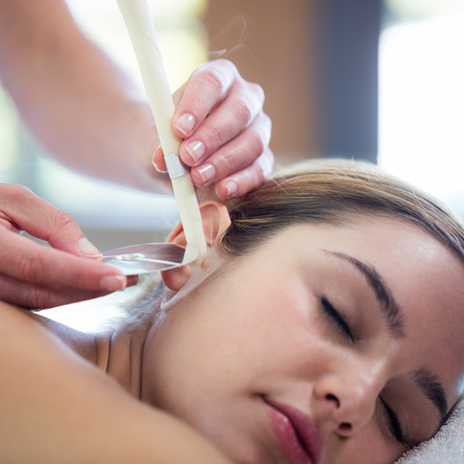
Ear candling
Alternate names: Auricular Candles, Auriculothérapie, Bougie Creuse, Bougie Hopi, Bougie d'Oreille, Chandelles Auriculaires, Cônage d'Oreille, Ear Candle, Ear Candle Therapy, Ear Candle Treatment, Ear Coning, Terapia de Vela en el Oído, Thérapie Auriculaire Thermale, Thermal-Auricular Therapy
Background
Ear candling is a procedure in which a lighted, hollow candle is inserted into the ear.
Ear candling is mainly used for clearing earwax and harmful substances (toxins) from the ear and for a variety of other conditions related to the ear canal and sinuses. These conditions include swollen sinuses (sinusitis), sinus pain, ear infections, ringing in the ears, and dizziness. Some people use ear candling to promote clear thinking.
Ear candles are legal in the US. However, they cannot be promoted as a treatment for medical conditions including earwax build-up. Ear candles are not permitted in Canada. In Europe, ear candles are regulated as medical devices.
Ear candling is mainly used for clearing earwax and harmful substances (toxins) from the ear and for a variety of other conditions related to the ear canal and sinuses. These conditions include swollen sinuses (sinusitis), sinus pain, ear infections, ringing in the ears, and dizziness. Some people use ear candling to promote clear thinking.
Ear candles are legal in the US. However, they cannot be promoted as a treatment for medical conditions including earwax build-up. Ear candles are not permitted in Canada. In Europe, ear candles are regulated as medical devices.
Safety Safety definitions
Ear candling is POSSIBLY UNSAFE. It has been linked to harm including burns from the lighted candle or hot wax. Other possible side effects include blockage of the ear canal with candle wax, temporary hearing loss, ear infection, and eardrum puncture.
Punctured eardrum (perforated tympanic membrane): Punctured eardrums have been linked to ear candling. In people who already have a punctured eardrum, ear candling might cause additional harm.
Special Precautions & Warnings:
Pregnancy and breast-feeding: There isn't enough reliable information to know if ear candling is safe to use when pregnant or breast-feeding. Stay on the safe side and avoid use.Punctured eardrum (perforated tympanic membrane): Punctured eardrums have been linked to ear candling. In people who already have a punctured eardrum, ear candling might cause additional harm.
Effectiveness
NatMed Pro rates effectiveness based on scientific evidence according to the following scale: Effective, Likely Effective, Possibly Effective, Possibly Ineffective, Likely Ineffective, Ineffective, and Insufficient Evidence to Rate.
Possibly ineffective Effectiveness definitions
- Removing earwax build-up. Research shows that ear candling does not remove earwax from the ear. Ear candling can even cause burns, blockage of the ear, hearing loss, and infection. Guidelines by ear, nose, and throat specialists recommend against ear candling.
Insufficient evidence Effectiveness definitions
- Clearing toxins from the ear canal.
- Swollen sinuses (sinusitis).
- Sinus pain.
- Ear infection.
- Ringing in the ears (tinnitus).
- Dizziness (vertigo).
- Improving mental function.
- Other conditions.
Dosing & administration
The appropriate or safe use of ear candling depends on several factors such as the condition being treated or the person administering the treatment. Be sure to seek and follow relevant directions from your physician or other healthcare professional before using this treatment.
Interactions with pharmaceuticals
It is not known if this treatment interacts with any medicines. Before using this treatment, talk with your health professional if you take any medications.
Interactions with herbs & supplements
There are no known interactions with herbs and supplements.
Interactions with foods
There are no known interactions with foods.
Action
Ear candling involves insertion of a hollow candle into the ear canal. The candle is lit and left in place for several minutes. People who support the use of ear candling think that the heat and suction from the hollow candle will suck out substances from the ear. When the candle is removed, a discolored, often brown, waxy substance often appears in the candle stub. Ear candling practitioners believe that this is earwax, bacteria, or other material extracted from the ear canal. However, research shows that ear candles do not suck substances out of the ear. There is no reliable evidence that ear candling can remove earwax or treat other conditions.
vital.ly has licensed monographs from TRC Healthcare.
This monograph was last reviewed on 31/07/2024 10:00:00 and last updated on 08/12/2020 03:12:10. Monographs are reviewed and/or updated multiple times per month and at least once per year.
Natural Medicines disclaims any responsibility related to medical consequences of using any medical product. Effort is made to ensure that the information contained in this monograph is accurate at the time it was published. Consumers and medical professionals who consult this monograph are cautioned that any medical or product related decision is the sole responsibility of the consumer and/or the health care professional. A legal License Agreement sets limitations on downloading, storing, or printing content from this Database. No reproduction of this monograph or any content from this Database is permitted without written permission from the publisher. It is unlawful to download, store, or distribute content from this site.




